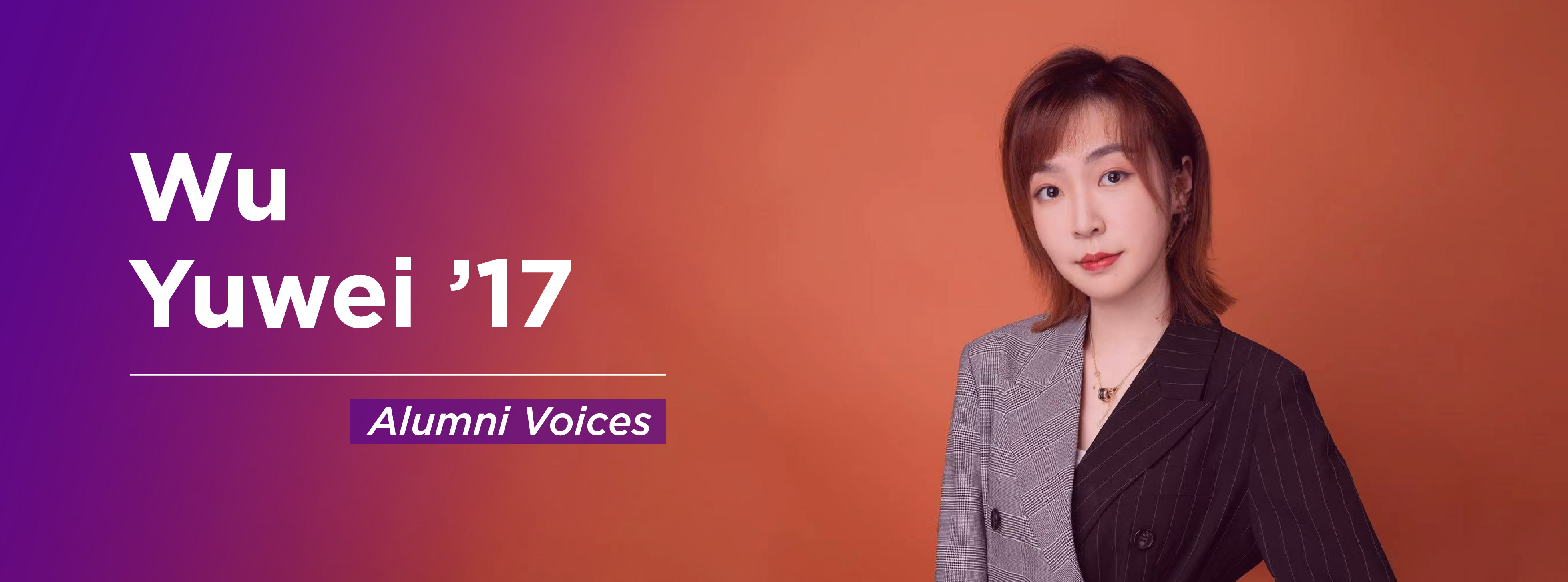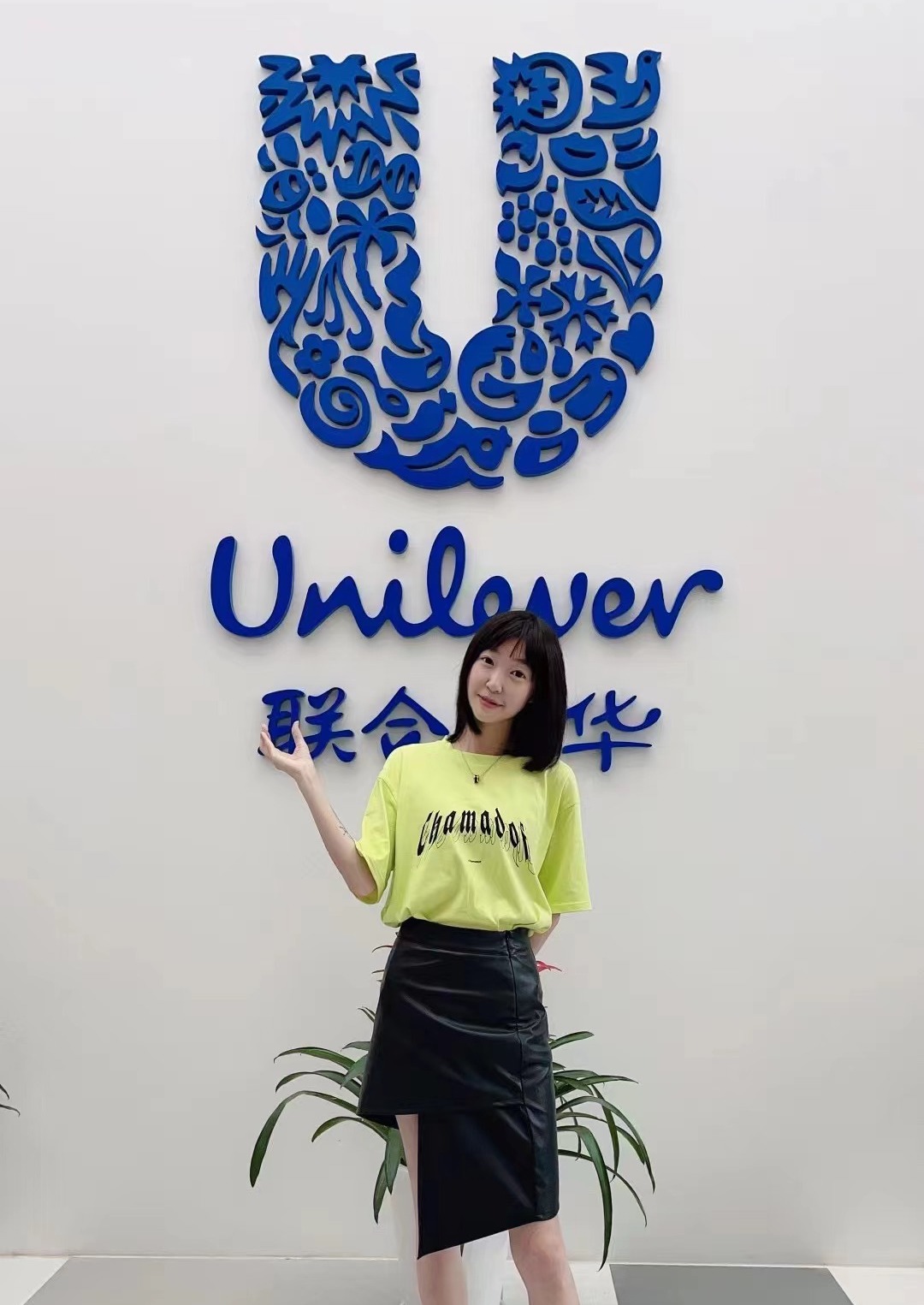
Wu Yuwei ’17
Hometown: Shanghai
Major: Mathematics
While a student at NYU Shanghai majoring in Mathematics, Wu Yuwei uncovered her passion for marketing through coursework and internships. Her post-graduation journey has taken her from L'Oréal to Unilever, and along the way she’s gained a taste for entrepreneurship. These varied experiences have helped her develop her own work philosophy through the achievements (and setbacks) she navigated.
How did you decide your major?
Like many students, the transition from high school to college left me feeling lost. It's a confusing period, with so many majors to choose from and an uncertain path ahead. Often, we're surrounded by people giving us advice, and it can be easy to just follow that guidance without thinking much for yourself.
I decided to listen to my high school math teacher’s advice that I start with Mathematics, because of its importance across various fields. I hoped to establish a solid foundation for exploring other possibilities.
How did you discover your interest in Marketing?
In the summer of my first year, I secured an internship at one of the Big Four accounting firms, PwC, thanks to the Career Development Center (CCD). It was my first time to work on consulting projects related to retail and marketing. I realized that my math skills could be applied in the business realm.
To gain a more systematic understanding of the field, I took Introduction to Marketing class taught by Distinguished Global Professor of Business Chen Yuxin. He also had transitioned from a foundational discipline to marketing and has been teaching at top business schools. I didn’t hesitate to enroll in a foundational course offered by such a great professor with the academic path I would like to pursue.
He encouraged me to delve deeper into the field by joining NYU Stern faculty’s projects during my study away semesters. I got the opportunity to join NYU Stern School of Business Professor Masakazu Ishihara’s research team using economic models to study the impact of the Japanese electronic gaming industry's primary market on secondary markets.
During this period, I not only acquired new knowledge, such as programming, but also had the rare opportunity to engage in research seminars and interact with numerous outstanding PhD students - an invaluable research experience for any undergraduate.
I also took a data-driven marketing course at NYU Stern School of Business, which gave me a sense of how mathematics and computer science could be integrated with marketing. I came to realize that marketing is not just about creative intuition; it's also a rational discipline that can be analyzed using big data.

Was pursuing an academic career your goal?
At the time, I was interested in marketing research and thought of pursuing further education. In the end, however, I decided to gain some real-world experience by entering the industry first. If I hadn't been in an actual work environment, I wouldn't have known what specific areas to focus my research on.
Where has your career path taken you?
I think there is often a gap in information between college students and the industries. If you don't understand what each job entails and whether it's a good fit for you, it can lead to many detours in your career development.
Luckily, thanks to the CCD’s Mentor-Mentee program, I was connected with a one-on-one career mentor. Michael Mi was an NYU Stern alumnus working on financial products at a tech giant, and we even graduated from the same high school.
We met every few weeks and I was able to ask him about the internet, finance, and fast-moving consumer goods (FMCG) industries – what they are like, what specific roles and responsibilities exist at certain companies and positions. He provided me with a wealth of valuable information and career development advice, and he also recommended some excellent internship opportunities.
It was with the encouragement of my mentor that I landed an internship in marketing research at Unilever during my senior year.
Why did you choose to kick off your career at L'Oreal? What was it like working there?
Given my affinity for numbers and interest in the FMCG sector, I decided to kickstart my career in e-commerce sales at L'Oréal. This initial role encompassed a wide range of responsibilities, including fostering creativity, conducting data analysis, engaging in digital marketing, and managing customer relationships, demanding not only the application of my expertise but also an abundance of perseverance to meet ambitious targets. I found it to be quite challenging.
Transitioning into a sales role introduced me to the intense competition and immense pressure that comes with it. While the advantage lies in the potential for individuals to make a substantial impact, the downside is the constant pressure to meet sales targets. I still remember moments of feeling disheartened and anxious when I fell short of these expectations.
After spending four years in the American educational system, where open discussion and questioning were encouraged, entering the job market was an adjustment for me. There were situations where voicing my suggestions or ideas openly wasn’t always feasible. These initial workplace challenges taught me valuable lessons in effective communication, managing my boss's expectations, and collaborating to accomplish tasks. I want to emphasize that this isn't necessarily a negative aspect; rather, it represents a different approach to work. I view it as an integral part of the learning experience.
What did you learn from the experience?
It’s crucial to maintain a balanced mindset. NYU Shanghai students are all exceptionally talented, and it's natural to feel the pressure to measure up. However, in the professional world, it's essential to maintain composure because the way you handle stress and your overall perspective will determine how far you can go. I believe everyone has a unique timeline. Whether you achieve your goals sooner or later than your peers is entirely normal, so don't put too much pressure on yourself.
Just like in academia, in the workplace, building relationships with mentors and allies is invaluable. Don't try to go it alone. You can seek help from some talented colleagues, tap into their resources, engage in discussions, and continuously learn from them. This is crucial for your professional growth.
You need to have the patience and persistence to support you through the lonely journey on the way to success. It takes time to establish yourself in a field. I left my e-commerce sales position after only a year and a half, and when I started working in trade marketing, I had moments of regret because I realized how interconnected different aspects of marketing are. That’s why I persisted in the field of trade marketing for years.
What was your trade marketing job at Unilever like?
Trade marketing at Unilever is a very influential and central department, controlling the direction of many business facets and fostering strong cross-departmental connections. While e-commerce is only one channel, trade marketing is about balancing multiple channels. For example, when launching a new product, you have to decide which channels to choose, allocate budgets reasonably, determine the strategy, and set pricing that satisfies the company, distributors, and consumers. Sometimes this involves economic models, which aligns well with my expertise, and I excel at them. It's very fulfilling.

One of my memorable achievements was overseeing the launch of a new product line. This was an innovative project, and it was my first time fully participating in the entire process. It felt like giving birth to a baby, and I developed a special attachment to it. It made me deeply realize that in marketing, you must treat the products you nurture with the care and attention you would give to a child. You need to have a deep love for the brand.
What led you to start your own business?
In 2021, a group of friends and I co-founded a tea bar brand with a business model akin to that of a hotel, where our goal was to fill private rooms. As the head of marketing, my most significant contribution was introducing entertainment options like board games and murder mystery games, which attracted a younger audience. We also engaged in cross-industry collaborations to bring in a larger customer base. At its peak, our tea bar brand had six branches in Shanghai.
However, during our financing process, we encountered equity-related issues, and the business faced challenges due to the pandemic, so we had to put it on pause.
What do you think gives NYU Shanghai students an edge in the job market?
The ability to solve problems and communicate across departments is essential in marketing.
When you encounter a problem, you need to know how to break down the big issue into smaller tasks, plan them logically, and tackle them one by one to ultimately solve the big problem. In this process, you will definitely need assistance from others, and you should know whom to approach and how to efficiently communicate your issue for best solutions.
NYU Shanghai students need to communicate and collaborate with people from different countries and cultures on a daily basis. Therefore, our advantages are our communication skills and flexibility, and we should make use of these strengths to grab opportunities to stand out at work.

Wu (right) sharing her experiences with students as an alumni representative during Orientation Week in 2018

